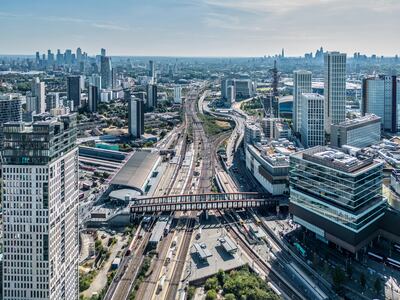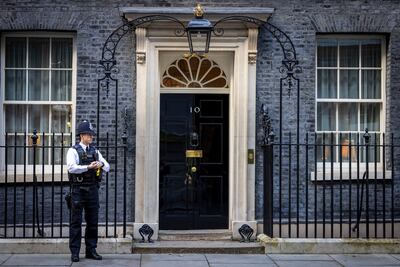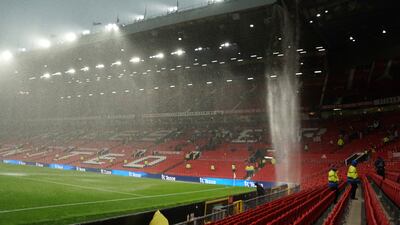It was a highly symbolic encounter.
Keir Starmer, Britain’s likely next prime minister, was invited to Old Trafford as a guest of Andy Burnham, mayor of Greater Manchester.
Before Sunday’s Manchester United v Arsenal match, they discussed with Sir Jim Ratcliffe, the United co-owner, redeveloping the football ground and the surrounding Trafford Park district. In all, the project could cost several billion pounds.
There is no indication as to who will pay for it, or even the lion’s share, but the signs are that Mr Burnham and Mr Ratcliffe expect national government to step up and make a hefty contribution.
Their talk is purely expansionist – how the North of England deserves a world-class stadium, its own “Wembley”, how the potential is for a transformation more spectacular than that of Stratford after the nearby London Olympics.
Stealing a Tory policy, the Labour Party mayor and his new best friend from business are insisting this is part of the “levelling-up” agenda. The fact that Mr Ratcliffe, a multibillionaire and the richest Briton, is also a tax exile living in Monaco, and here he is, seeking public funding, is conveniently forgotten. As is United’s position as one of the wealthiest football clubs in the world.
So too, it seems, is that Mr Starmer and his shadow chancellor, Rachel Reeves, are repeatedly warning there is no spare money. If, when they take over, such is the state of the government’s finances, they are saying they’re unable to make new spending promises.
Nice things
Yet, here was the Labour leader sitting down to discuss a scheme, which surely must fall into the category of “nice thing to have”. It does not entail the building of new hospitals or schools or social housing or day welfare centres or cross-region transport links.
Neither does it embrace the provision of extra social workers and police and other public officials. All that and more is much-needed.
Compared to most places in the post-industrial North, indeed versus the rest of Britain, including London, Manchester is testament to the value of council leaders pushing and persuading.
In short, if you did find another £3 billion ($3.77 billion) or so, you might think twice about devoting it to a metropolis that has already had its fair share.
Local kings

The feeling persists that what Andy Burnham wants, Andy Burnham gets. He is not called “King of the North” for nothing.
He is the second-most powerful Labour politician after Mr Starmer. Included in that is his fellow mayor, Sadiq Khan. Mr Burnham has a stranglehold over his constituency that Mr Khan in London simply does not possess.
This is where it gets tricky: arguably, given their respective favourability ratings, Mr Burnham carries more weight than even Mr Starmer himself.
In theory, the purse belongs to the Treasury. Mr Burnham, Mr Khan and the other regional mayors – I nearly said barons – have little leeway when its comes to expenditure. The clout that brings resides in the capital, firmly in Whitehall.
That was how the system of devolved mayoralties was constructed. Mindful of demands from folk in areas away from London for a greater say in how their localities were managed, Westminster conceded to a middle tier of elected politicians, between town and city councils and Parliament.
To make sure they did not exceed themselves, the finances stayed with the Prime Minister. That was one reason; another was that it ensured the new mayors could not become as mighty as Westminster.

As time has moved on, however, that’s not how it has remained. Such has been the unpopularity of successive recent national administrations, all Conservative, that the balance has swung. The mayors may still not technically possess the financial levers, but they have popular opinion firmly behind them.
Mayor v No 10
Outside London you never had to go far to find dissatisfaction with the centre. Over the last few years that has increased – as estimation of Downing Street has fallen, so have the regional mayors risen.
It was evident in the recent local elections. Counting for the regional mayoralties mostly occurred on the Saturday, with many smaller councils having declared the day before. But these counts were bigger, running into millions, and they took centrepiece. All bar one went to Labour. The sole Tory, Ben Houchen, triumphed in Tees Valley. Again, similar to Mr Starmer obeying Mr Burnham’s wish and heading to Old Trafford to meet Mr Ratcliffe, Rishi Sunak dropped everything and rushed to be at Mr Houchen’s side.
No matter that Mr Houchen did not cite the national Tory party or regime in his campaign. Neither did he praise Mr Sunak or the Conservatives in his victory speech. It was devoted to thanking his supporters and describing what he’d done and will do for Tees Valley.
This has become a running theme, that the new power grouping pay increasingly little heed to their national party or the party bosses. The trend is about them as individuals and what they have brought and what they will bring.
Where once being mayor for one of the regions was regarded as a dead-end post politically, it’s not any more. Senior Westminster folk are queuing up to be candidates for what are seen as more attractive jobs, offering more influence than certainly a backbencher and, possibly, a ministerial or junior Cabinet seat.

The genie has been let out of the bottle. There can be no going back where regional mayors are concerned. As it is, they are due to grow in number, not contract.
What lies ahead is the prospect of conflict as they play on their standing and demand ever greater muscle. Nobody at Westminster dare curb Mr Burnham and the rest.
The Greater Manchester mayor has set an early test for Mr Starmer. The latter, unwittingly, by going there and being seen to hold talks, may have walked into a trap.
Certainly, it will be telling how he responds. If, by some miracle, he discovers a cache of funding – however it is portrayed – to support the reconstruction of the Manchester United football ground, we will know the answer.


